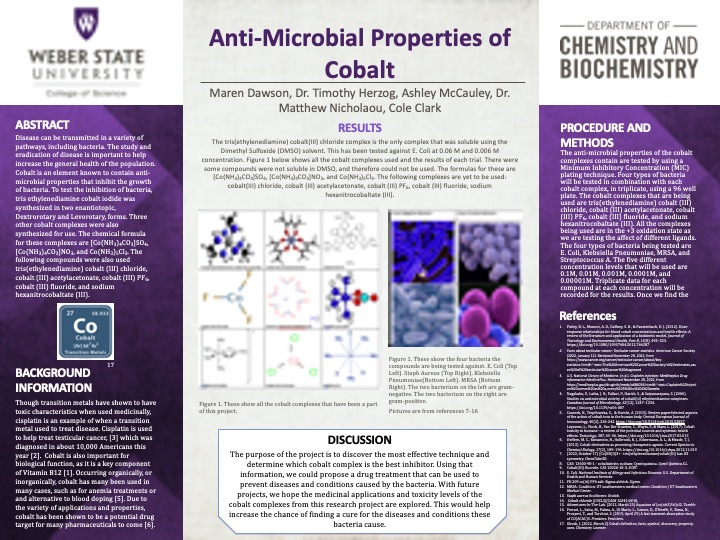Presenter Name: Maren Dawson
Description
Disease can be transmitted in a variety of pathways, including bacteria. The study and eradication of disease is important to help increase the general health of the population. Cobalt is an element known to contain anti-microbial properties that inhibit the growth of bacteria. To test the inhibition of bacteria, tris ethylenediamine cobalt iodide was synthesized in two enantiotopic, Dextrorotary and Levorotary, forms. Three other cobalt complexes were also synthesized for use. The chemical formula for these complexes are [Co(NH3)4CO3]SO4, [Co(NH3)4CO3]NO3, and Co(NH3)5Cl3. The next step is examining the anti-microbial properties cobalt complexes contain by using a Minimum Inhibitory Concentration (MIC) plating technique. Four types of bacteria will be tested in combination with each cobalt complex, in triplicate, using a 96 well plate. The four types of bacteria being tested are E. Coli, Klebsiella Pneumoniae, MRSA, and Streptococcus A. The five different concentration levels that will be used are 0.1M, 0.01M, 0.001M, 0.0001M, and 0.00001M. Triplicate data for each compound at each concentration will be recorded for the results. The purpose of the project is to discover the most effective technique and determine which cobalt complex is the best inhibitor. Using that information, we could propose a drug treatment that can be used to prevent diseases and conditions caused by the bacteria. With future projects, we hope the medicinal applications and toxicity levels of the cobalt complexes from this research project are explored. This would help increase the chance of finding a cure for the diseases and conditions these bacteria cause.
University / Institution: Weber State University
Type: Poster
Format: In Person
Presentation #B68
SESSION B (10:45AM-12:15PM)
Area of Research: Science & Technology
Email: marendawson@mail.weber.edu
Faculty Mentor: Timothy Herzog

